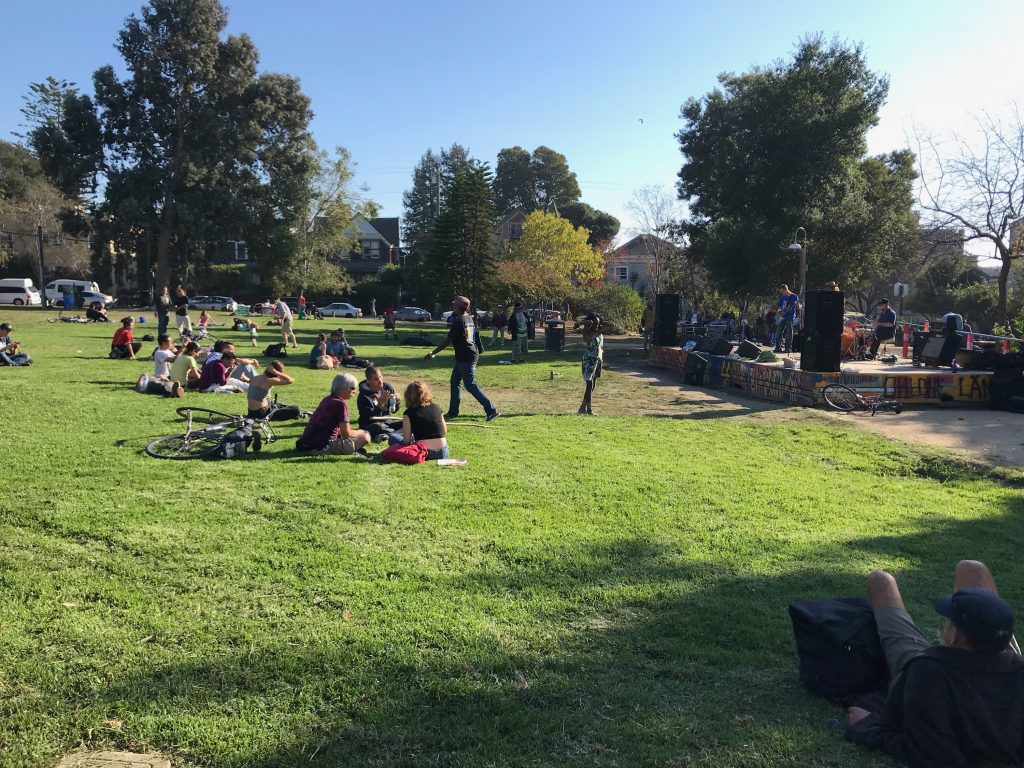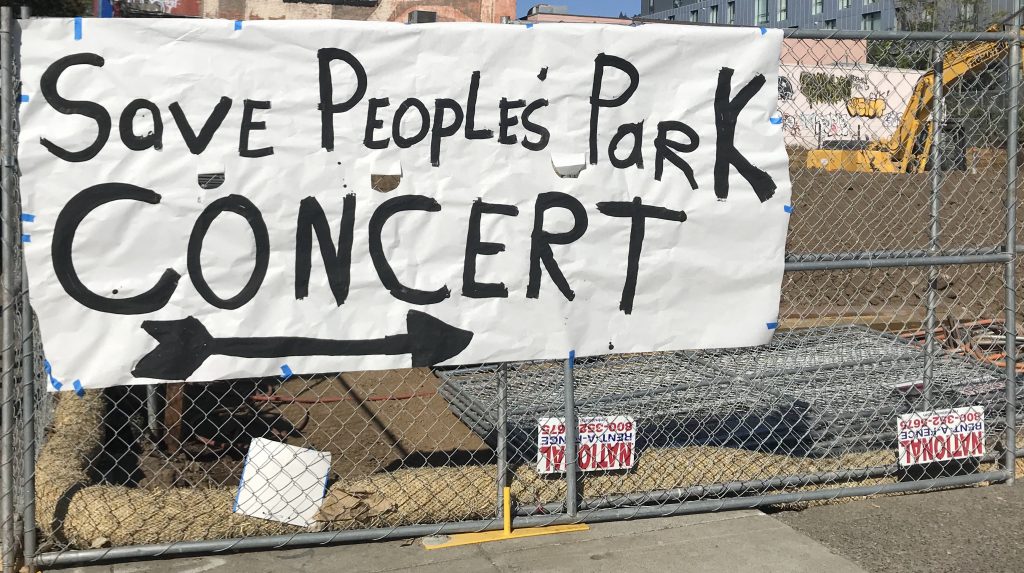
On October 20, someone taped an invitation to a fence on Haste Street.
Scrawled on a 6 by 4 foot piece of butcher paper, black writing publicized a ‘Save People’s Park Concert’. The accompanying arrow points east, up Haste Street, a one-way with cars flowing the other direction. Sproul Hall, a symbol of the University, is 500 yards up the street.
The concert was held as a part of the ongoing opposition to the University’s plan to build on top of the park. In May, the University announced that it would divide the land it into half student housing, a quarter supportive housing, and a quarter park space. The plan attempts to address need for student housing, the need for a green space, and a place for homeless residents to build community and receive resources. But many of the people who utilize the park feel that this plan would eliminate one of the last places in Berkeley where travelers and unhoused people can exist freely.

Talking about the University’s plan, People’s Park Committee leader Lisa Teague repeats the simple refrain that has colored democratic demands for decades: “Nothing about us without us.” The people frequent the park and those who support it are asking to be part of the conversations about the future allocation of the land. As for what the University has suggested? “We hate every part of it,” Teague said. The Committee meets in the park every Sunday, around 1 p.m.
In all, around 150 people attend the 4 hour concert. East Bay bands 2 Lazy Boys, Ripe Species, Stranger than Fact, and Uromastyx all play sets to benefit the effort. The folks who stay to listen to the bands are veterans of the movement: Some are homeless folks who have been staying in the area, others are dedicated supporters of the park who have been part of the community for a long time
Mandy ‘Danger’ attended the concert with her two daughters. They’ve met up with friends they met when they lived in the park four years ago. She and her partner left when she got pregnant with her daughter, who they named ‘Parker’, inspired by their love for the park. Although they now live in Mendocino, they wanted to come down to the concert to show their solidarity.
“We wanted to show up today, use the park, and bring the kids. There is a community here; people know (Parker and Aurora), no one tries to feed them meth,” she said, referring to a 2017 incident in which a woman allegedly inserted methamphetamines into the mouth of a toddler visiting the park.

But it’s hard to get random passersby to come up to the concert. The 2.8-acre park isn’t tucked away per se, but it’s flanked by narrow roads and tall residential buildings. Shoppers browsing Telegraph’s storefronts and street markets rarely venture the half-block up the hill, and students headed to study on the University campus hurry north.
In its attendees, the concert reveals a piece of the park’s history. The land of People’s Park was once residential, until it was seized by the University of California under eminent domain and bulldozed in 1968. Frustrated by the lack of action in months afterward, the community and visitors began to transform the land into a park, where it was then used in conjunction with free speech and anti-war protests.
Then, in an effort to reclaim the land, the UC Board of Regents called Ronald Reagan, then-governor of California, who sent a team of armed soldiers to sweep the park, an event that became known as ‘Bloody Thursday,’ due to the violent nature of the confrontation. Since then, the space has been primarily occupied by homeless people who use it to convene and find community.
Berkeley City Council District 7 candidate Aidan Hill believes the University is responsible for perpetuating a fear of the homeless and a fear of the park among students. “The University has deprived the park of so many resources in order to push people out,” Hill said during the concert.
The greater Berkeley community has shown some willingness to work with the park. Every weekday at 3 pm, relief group Food Not Bombs serves a vegan meal to anyone who needs it. Two years ago, the University hired a counselor to get resources to people in the park, something that has been a huge boon to the community, according to the park’s co-founder, Michael DeLacour. However, city police clear the space every night at 10, when the park technically closes. Those in the park pack up and find another place to spend the night. This exodus will be permanent if the UC’s project goes underway. This leaves many with nowhere to go—echoing the exodus that will come if the bulldozers return.
At the concert, between acts, attendees heard from voices that have been prominent in the debate. Andrea Pritchett, Berkeley activist and part of the Police Review Commission, stirred concertgoers with her call to action.
“This park is survival. It has always been a fight about the land: we’ve been fighting it for decades. People’s Park symbolizes the right for people to exist—for poor people to exist, to share and build community. It is not about a park, it is about a right to remain, ” she said.
Kate Wolffe is a reporter and weekend host at KQED.
